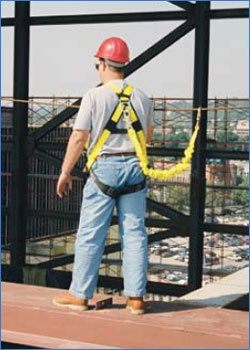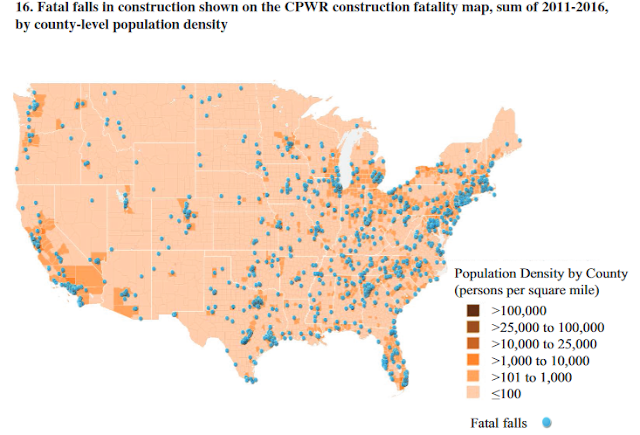Silver Spring, MD – Fall-related construction worker fatalities increased 36 percent from 2011 to 2015, outpacing an increase in construction employment and total industry fatalities, according to a new report from the Center for Construction Research and Training, also known as CPWR.
Employment in the construction industry climbed to 10.3 million workers in 2016, a 16 percent increase from 2012, the report states. Meanwhile, the construction industry experienced a 26 percent increase in overall fatalities from 2011 to 2015. A total of 367 construction workers suffered fatal falls in 2015.
Data presented in the report comes from the Bureau of Labor Statistics. Other findings:
- 55 percent of fatal falls came from heights of 20 feet or less.
- 33 percent of fatal falls involved falls from roofs, 24 percent involved ladders, and scaffolds and staging accounted for 15 percent.
- Fatal falls in residential construction rose to 61 in 2015 from 26 in 2011.
- Roofers continue to experience the highest rate of fatal falls to a lower level: 31.5 per 100,000 full-time workers, although this represents a decrease from 39.9 in 2014.
- Workers at an increased risk of fatal falls include Hispanic workers, foreign-born workers, and workers 55 years and older.
“These are real people behind the numbers, and they show up every day expecting to come home,” CPWR Research Analyst Gavin West said during a May 9 conference call.
The report was released during the 2017 National Safety Stand-Down to Prevent Falls in Construction (May 8-12). Falls are the leading cause of death among construction workers, according to NIOSH, accounting for 37 percent of deaths in the industry.
“The findings in this report emphasize the need to reduce falls and the importance of the ongoing National Fall Prevention campaign,” CPWR states. “It is estimated that the Safety Stand-Down events have reached more than 5 million workers (including those without certificates) across the nation in a three-year period [2014 to 2016], vitally raising public awareness of the risk of falls and importance of fall prevention in the construction industry.”
Source: National Safety Council
===================
Conclusion
Fall injuries and fatalities increased as construction rebounded with the economic recovery. In 2015, 367 construction workers died from falls, a 36% increase from 2011, surpassing the growth in employment and overall
fatalities in this industry. The clusters of fall fatalities shown on the CPWR Fatality Maps were consistent with the BLS data, illustrating the positive correlation of fall injuries with population density and construction activity.
The increase in fall fatalities was more pronounced in residential building construction and among Hispanic workers than for the overall construction industry. This report also confirmed that fall risk exists at low heights, demonstrated by the fact that more than half of all fall fatalities (55%) between 2011 and 2015 occurred from a height of 20 feet or less. Moreover, roofers, older workers, Hispanic workers, foreign-born workers, and self-employed workers had a higher risk of fatal falls than the average among all construction workers. Nevertheless, fatal falls among roofers showed signs of decrease in recent years. Fall protection efforts may have contributed to this reduction.
The findings in this report emphasize the need to reduce falls and the importance of the ongoing National Fall Prevention campaign. It is estimated that the Safety Stand-Down events have reached more than 5 million
workers (including those without certificates) across the nation in a three-year period, vitally raising public awareness of the risk of falls and importance of fall prevention in the construction industry. The campaign encourages construction contractors to PLAN ahead to get the job done safely, PROVIDE the right equipment to workers, and TRAIN workers to use the equipment safely.






